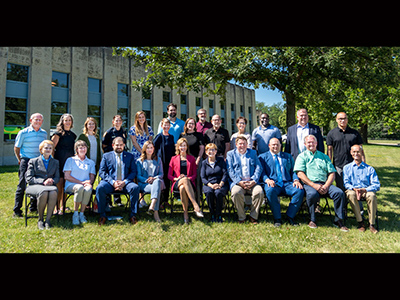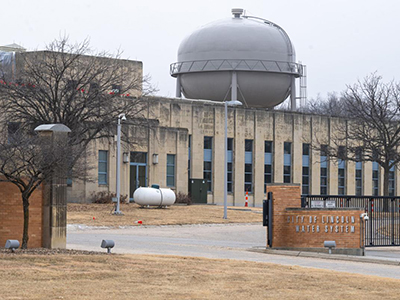Water Center director helps City of Lincoln find second water source

Credit: City of Lincoln, Nebraska
The City of Lincoln, Nebraska — home to both DWFI and the Nebraska Water Center (NWC) — is projecting population growth that will exceed its current water system. The city has adequate supply for the next 20 to 25 years but planning is needed to prepare for the future.
In 2022, Lincoln’s Mayor, Leirion Gaylor Baird, and the City of Lincoln considered options to support its water needs for years to come. Chittaranjan Ray, director of the Nebraska Water Center, was selected to serve on the Mayor’s Water Source Advisory Council to advise decision-makers in the search for a secondary water source for Lincoln. Dr. Ray joined representatives from natural resources groups, as well as business and community leaders. The project, titled “Water 2.0: Securing Lincoln’s Second Source,” is the largest public works project to date supporting Lincoln’s health, growth, and vitality into the future.

Credit: Lincoln Journal Star
The city’s existing infrastructure for clean, safe drinking water consists of wells built on the Platte River near Ashland in 1932. Current projections estimate the existing wellfield is adequate to supply drinking water for the next 26 years. A secondary water source is needed to support future generations of Lincolnites in the following decades.
In February 2023, after input from the advisory council and others, the City of Lincoln announced their decision to undertake a $1.39 billion project to create a well field along the Missouri River and build an underground pipeline to Lincoln. This plan was selected by considering a combination of environmental factors, previous flood and drought events in the Lincoln area, and the overall cost of the project. Construction is expected to be completed by 2048 and the new well field is projected to support Lincoln’s water needs until at least 2075.
FY 2023 Annual Report
- Overview
- Introduction
-
Research and Policy
-
Global
- Brazilian agricultural state looks to Nebraska and DWFI to sustainably manage water resources
- Irrigation equipment ownership not always best for smallholder farmers
- McCornick and Neale re-elected to World Water Council, DWFI involved in preparations for the World Water Forum
- Understanding the agtech ecosystem in India can spur future investments
-
Regional + National
- DAWN Project testing its decision-support tools with corn and soybean growers
- Water Center director helps City of Lincoln find second water source
- Water, Climate and Health program makes an impact in Nebraska
- DWFI's flux tower network now helps validate carbon credits
- Understanding climate’s effect on the health of Americans
- Groundwater transfer success stories guide water managers in meeting local water needs
- Advancements in crop modeling help adapt to climate change
-
Global
-
Education
- Faculty Fellows
-
Supported Students
- DWFI funds eight new students working on mission-related projects
- DWFI continues support of Platte Basin Timelapse interns
- Estimation of manure nutrient capacity in Nebraska minimizes water quality impacts
- Could cover crops replace offset in-season corn fertilizer?
- Congratulations to DWFI-supported student graduates
-
Communication
- Digital and online engagement connects DWFI with its global audience
- Coverage of DWFI research and events reaches more than 219 million people
- Creative storytelling used to amplify DWFI smallholder irrigation research outputs
- DWFI expertise tapped for national reports and publications
- DWFI staff receive well-deserved recognition
- 2022 Nebraska Water Center Annual Report now available
-
Outreach and Events
- Global Conference draws international audience to address water and food security
- On-farm event in Western Nebraska strengthens partnerships, spurs new ideas
- Engagement recovers to pre-pandemic levels
- Drought at forefront of discussions at Platte River Basin Conference
- 49th Annual Water Tour broadens knowledge about Nebraska water
- Nebraska Water Center seminars focus on hot topics in Nebraska Water
- Development
- Resources
- Search
FY 2023 Annual Report
- Overview
- Introduction
-
Research and Policy
-
Global
- Brazilian agricultural state looks to Nebraska and DWFI to sustainably manage water resources
- Irrigation equipment ownership not always best for smallholder farmers
- McCornick and Neale re-elected to World Water Council, DWFI involved in preparations for the World Water Forum
- Understanding the agtech ecosystem in India can spur future investments
-
Regional + National
- DAWN Project testing its decision-support tools with corn and soybean growers
- Water Center director helps City of Lincoln find second water source
- Water, Climate and Health program makes an impact in Nebraska
- DWFI's flux tower network now helps validate carbon credits
- Understanding climate’s effect on the health of Americans
- Groundwater transfer success stories guide water managers in meeting local water needs
- Advancements in crop modeling help adapt to climate change
-
Global
-
Education
- Faculty Fellows
-
Supported Students
- DWFI funds eight new students working on mission-related projects
- DWFI continues support of Platte Basin Timelapse interns
- Estimation of manure nutrient capacity in Nebraska minimizes water quality impacts
- Could cover crops replace offset in-season corn fertilizer?
- Congratulations to DWFI-supported student graduates
-
Communication
- Digital and online engagement connects DWFI with its global audience
- Coverage of DWFI research and events reaches more than 219 million people
- Creative storytelling used to amplify DWFI smallholder irrigation research outputs
- DWFI expertise tapped for national reports and publications
- DWFI staff receive well-deserved recognition
- 2022 Nebraska Water Center Annual Report now available
-
Outreach and Events
- Global Conference draws international audience to address water and food security
- On-farm event in Western Nebraska strengthens partnerships, spurs new ideas
- Engagement recovers to pre-pandemic levels
- Drought at forefront of discussions at Platte River Basin Conference
- 49th Annual Water Tour broadens knowledge about Nebraska water
- Nebraska Water Center seminars focus on hot topics in Nebraska Water
- Development
- Resources
- Search
Top image caption
The city has adequate supply for the next 20 to 25 years but planning is needed to prepare for the future.
Credit: Lincoln Journal Star
Related Articles
DWFI expertise tapped for national reports and publications
DWFI’s research and expertise is frequently requested for respected industry publications and reports. Here is a sample of the publications.
2022 Nebraska Water Center Annual Report now available
The Nebraska Water Center’s 2022 annual report is now available. This report highlights the research, outreach, and training done to support the Water Center’s mission in 2022.
Creative storytelling used to amplify DWFI smallholder irrigation research outputs
The DWFI communications team has capitalized on engagement growth in the digital space as a result of the pandemic.
COOKIE USAGE:
The University of Nebraska System uses cookies to give you the best online experience. By clicking "I Agree" and/or continuing to use this website without adjusting your browser settings, you accept the use of cookies.

